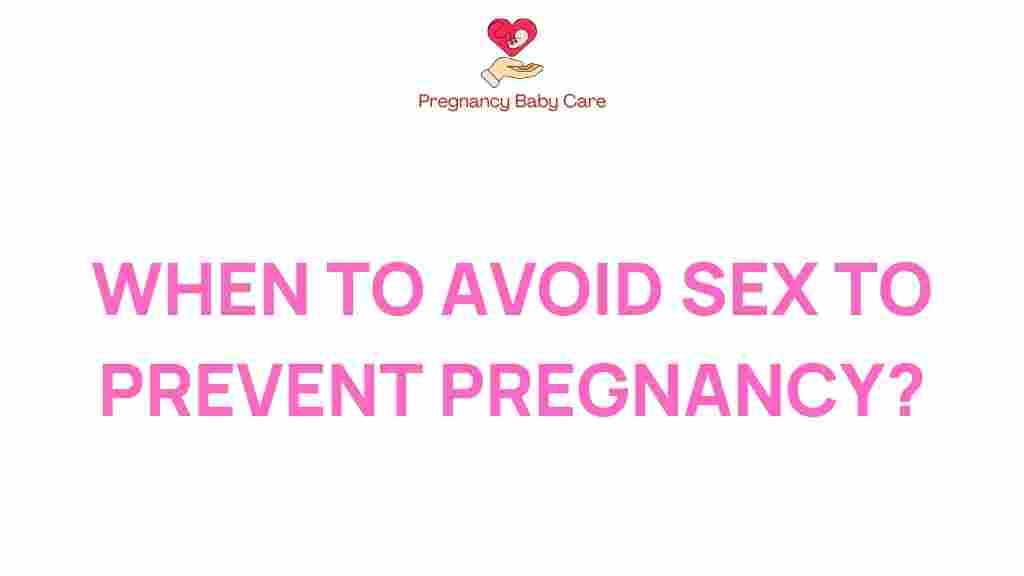Unlocking the Secrets: When to Avoid Sex to Prevent Pregnancy
Understanding how to prevent pregnancy is a crucial aspect of sexual health and responsible reproductive choices. With various contraceptive methods and fertility awareness techniques available, individuals and couples can make informed decisions about their sexual activities. In this article, we will explore the importance of pregnancy prevention, safe sex practices, and how to navigate your reproductive choices effectively.
Understanding Pregnancy Prevention
Pregnancy prevention is not just about avoiding unwanted pregnancies; it’s about making informed decisions regarding sexual health. Whether you are planning a family or want to delay pregnancy, understanding your options is paramount. Here are some key aspects to consider:
- Contraceptive Methods: From hormonal pills to barrier methods, various contraceptive options help prevent pregnancy.
- Fertility Awareness: By tracking your menstrual cycle and understanding ovulation, you can better determine when to avoid sex.
- Safe Sex Practices: These practices help reduce the risk of sexually transmitted infections (STIs) alongside preventing pregnancy.
When to Avoid Sex for Pregnancy Prevention
To effectively prevent pregnancy, timing can be crucial. Here are some situations when you might want to avoid sexual intercourse:
- During Ovulation: Engaging in sex during ovulation significantly increases the chances of conception. Ovulation typically occurs about 14 days before your next menstrual period.
- When Not Using Contraceptives: If you are not using any form of contraception, consider avoiding sex, especially if you are unsure about your cycle.
- After Unprotected Sex: If you’ve had unprotected sex during your fertile window, consider emergency contraception and avoid further sexual activity until you have a clear plan.
Step-by-Step Process for Effective Pregnancy Prevention
To maximize the effectiveness of pregnancy prevention, follow these steps:
- Educate Yourself: Gain knowledge about your menstrual cycle and the signs of ovulation. Understanding your body is key.
- Choose a Contraceptive Method: Discuss with your healthcare provider to select a birth control method that suits your lifestyle and health needs.
- Track Your Cycle: Use apps or calendars to record your menstrual cycle, helping you identify your fertile days.
- Communicate with Your Partner: Open discussions about your reproductive choices and plans can help ensure both partners are on the same page.
- Practice Safe Sex: Use condoms or other barrier methods to protect against STIs and unintended pregnancies.
Troubleshooting Tips for Effective Pregnancy Prevention
Even with the best intentions, things can occasionally go wrong. Here are some troubleshooting tips:
- Missed Birth Control Pills: If you forget to take your pill, follow the instructions on your medication for missed doses. If you miss several, consider using a backup method.
- Condom Breakage: If a condom breaks during intercourse, consider using emergency contraception and consult a healthcare provider.
- Irregular Cycles: If your cycles are unpredictable, consider using additional contraceptive methods to prevent pregnancy.
Importance of Sexual Education
Comprehensive sexual education plays a critical role in informing individuals about pregnancy prevention and sexual health. It empowers people to make informed decisions about their bodies and relationships. Here are some reasons why sexual education is vital:
- Informed Choices: Knowledge about contraceptive methods and reproductive health allows individuals to make choices that align with their goals.
- Awareness of STIs: Understanding the risks of sexually transmitted infections and how to protect oneself is essential for overall health.
- Healthy Relationships: Education fosters communication and respect in relationships, helping partners discuss their reproductive choices openly.
Planning a Family: The Right Timing
For those considering starting a family, understanding when to avoid sex is just as important as knowing when to conceive. Here are some tips for planning a family effectively:
- Understand Your Fertility: Learn about your body and when you are most fertile to maximize your chances of conception.
- Consult a Healthcare Provider: Discuss your plans with a healthcare professional who can guide you on preconception health and family planning.
- Prepare Emotionally and Financially: Ensure you and your partner are ready for the responsibilities that come with parenthood.
Conclusion
In conclusion, understanding when to avoid sex can significantly aid in pregnancy prevention and promote sexual health. By being informed about contraceptive methods, practicing fertility awareness, and engaging in safe sex practices, individuals can make empowered reproductive choices. Whether you are planning a family or want to postpone pregnancy, maintaining open communication with your partner and seeking guidance from healthcare providers are essential steps. For more information on sexual health, consider visiting this resource, and for a deeper understanding of contraceptive options, check out this guide. Remember, informed decisions lead to healthier relationships and better sexual health outcomes.
This article is in the category Pregnancy and created by PregnancyBabyCare Team
